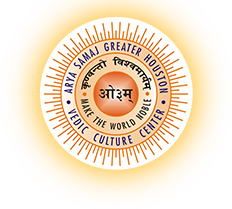Sanskars
There are sixteen religious ceremonies known as Sanskars, or sacraments, in a life.(See Manu 2/2,2/4,2/5-8,2/9,2/35,2/11-43,2/44-224,2/40,3/1-3,3/4-62,3/67-286,5/167,6/1-32,6/33-97,12/82-125). These Sanskars, or sacraments, are performed for physical, social and spiritual development of an individual.
Indeed these ceremonies are the rites of passage, which transform an individual as a distinctive human being, the existence is accepted and recognized by the society as part and parcel of the society. In these ceremonies Agnihotra plays a very important part. These ceremonies are indicative of an individual’s growth and development, and also the acknowledgement by the family and the society. The acknowledgement of this unique individualization process at every step of growth helps enrich the person’s life. Sanskars prepare one for the next stage of growth. Sanskars do promotes one’s potentials and progress in all spheres of life, including the physical, social, emotional, and spiritual. Sequentially, these ceremonies and rituals are outlined to fulfill life’s role from the beginning to the end which are stated as follows:
- Garbhadhana - conception acceptance ceremony (After solemnizing marriage ceremony).
- Punsavana - ceremony of graceful care of the embryo and development of the fetus. Usually it is undertaken during second or third month of pregnancy, or the first trimester.
- Sementonnayana- (akin to a ladies shower), living God’s blessing for the development of the fetus to full born. Usually the blessing is conducted from the fourth month of pregnancy and onwards during the second and third trimester of pregnancy.
- Jatakarma - accepting and identifying the newborn as an individual being.
- Namakarana - naming ceremony usually is under taken on the eleventh day, or before twelfth day of birth.
- Niskramana - ceremony of invoking God’s blessing to expose the new comer to the outside world and to pray for the wellbeing of the baby. Usually it is conducted when child is two to four months old.
- Annaprasana - offering of solid food to the toddler. Usually from four to six months.
- Chudakarma -self awareness ceremony(One year and onwards).
- KaranVedha – self esteem development ceremony. The use of ornaments helps improve self image and self respect. It further enhances one’s responsibility. Usually three to five years.
- Upanayana – school entrance initiation. To help control the fear of separation from parents and to overcome the anxieties of entering in the strange place of learning such as school. It is also called Yajnopaveet Sanskar and is usually conducted at five year of age and onwards.
- Vedarambha – education enrichment ceremony. Five years and onwards.
- Samavartana – welcome ceremony after completion of studies and to be accepted as a qualified individual. This ceremony is the last ceremony of Brahmcharya Ashram. Brahmcharya Ashram is the name given to that stage of life in which one learns skills necessary to earn a successful living. It usually lasts from birth to the first twenty-five year of life.
- Vivaha – marriage ceremony. To select an appropriate spouse and to start the second phase of life as householder which is usually under taken at the age of twenty-five years.It is the beginning of Grihastha Ashram.
- Vanaprastha Ashram – After enjoying and fulfilling all desires, or Karma by earning money, Artha by righteous means and doing benevolent deeds Dharma, one is now ready to march ahead in life to conquer gratifications. The usual period is fifty to seventy five year of age. It is called Vanaprastha Ashram. This is similar to a retirement planning state. The sage is set for introspection and reassessment of life’s goals. The next stage is of complete renunciation.
- Samnyasa Ashram –selfless service to mankind. Usually Samnyasa is attained by spiritual awakening. When someone dedicates his or her life for societal upliftment without any personal gain, that person has entered the Samnyasa Ashram, and the ceremony confers the title of Samnyasa. A Samnyasa is one who devotes oneself to the service of humanity and one may directly choose this phase of life from Brahmacharya Ashram, if one is so inclined . Otherwise, Samnyasa Ashram is usually undertaken at the age of seventy-five year and onwards.
- Antyesti - this is the last ceremony in a life. During the Antyesti ceremony the remains are cremated, when the soul has left the mortal body. The body elements are consumed by fire and are disposed to nature, Prakriti, in its five elements : earth, water, air, energy and space. Then the cycle of life starts all over again. Practical Significance: If any one does not wish to learn any skill, or complete education, or follow the Sanskars of Brahmcharya Ashram, then, one has failed to be self sufficient, and has not prepared oneself to make a righteous living. Then can anyone imagine what kind of societal structure humanity is going to bear? It will have innumerable consequences, including the spread of venereal diseases, teenage pregnancy, increased infants mortality, and broken families, and the development of antisocial atmosphere.
Anthropologists have verified the destruction of those cultures who do not initiate their youths.
Sanskars are the community events that mark the process of end of child hood and the dependencies on parents, as one gain a new social status and a new level of social responsibility conferred through rituals and initiation. Therefore, it is a rite of passage, and, indeed, the welcoming of the young person into the larger community of adults.
Sanskars are essential part of life to deal the crisis in transition from adolescence to adulthood and then into mid-life.
Sanskars allay the anxiety and develop the social support system and cohesion that is so important to survive. Sanskars make people better social human beings.
To conduct any of the above Sanskars or sacraments, please contact Arya Samaj Greater Houston, 281-752-0100 or Acharya Surya Narayana ji at (832) 867-4126 or Acharya Harish Chandra Ji at (832) 874-3248.
